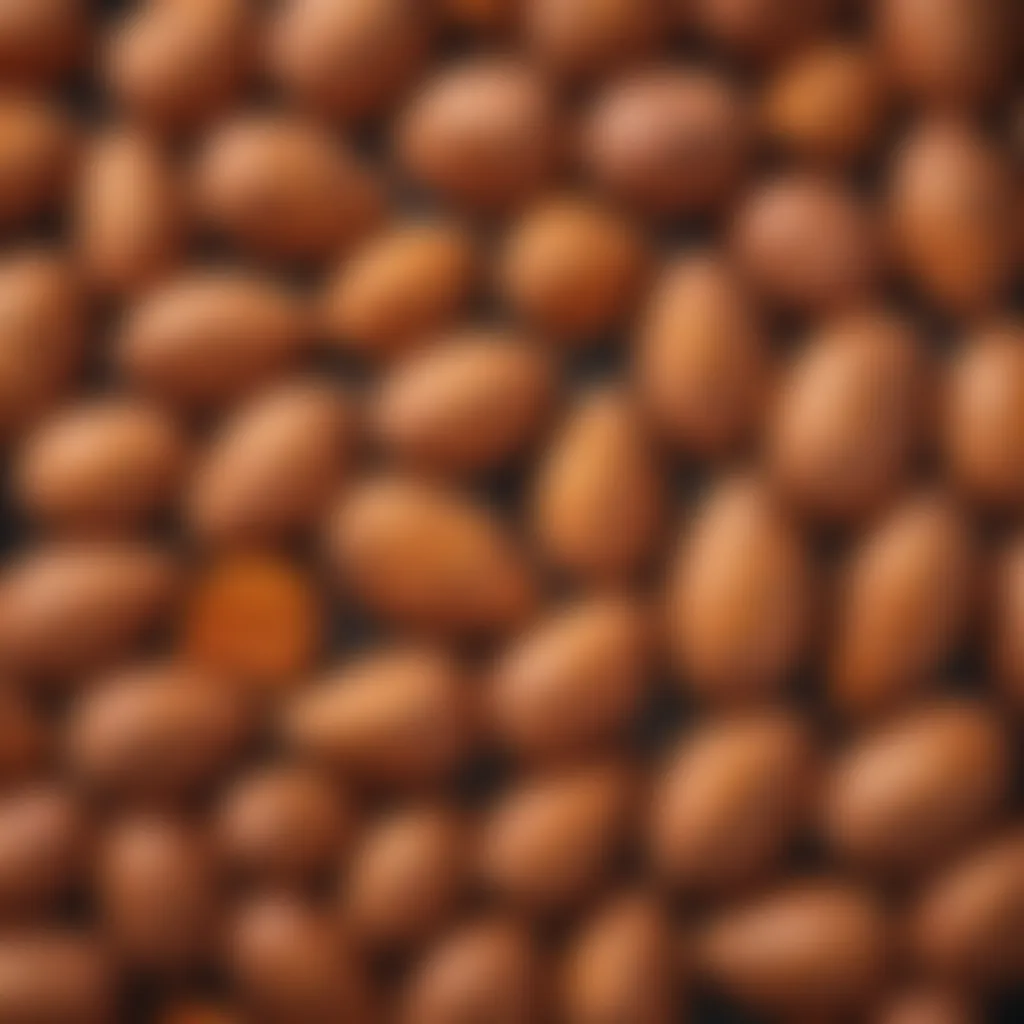Understanding Carbohydrate Content in Sweet Potatoes


Intro
Sweet potatoes are a nutritious and versatile food that many households enjoy. This article focuses on understanding the carbohydrate content in sweet potatoes, exploring factors that influence their carbohydrate levels, such as serving size, cooking methods, and nutritional value. A deeper understanding of these aspects will help readers make more informed dietary choices. Along with this, a comparison with other root vegetables and the overall health benefits of sweet potatoes will provide a well-rounded view.
Ingredients:
When preparing sweet potatoes, gathering the right ingredients is essential for a wholesome meal. Here is a clear list of what you need:
- Sweet potatoes: 2 medium-sized (about 1 pound total)
- Olive oil: 2 tablespoons
- Salt: 1 teaspoon (or to taste)
- Black pepper: ½ teaspoon (or to taste)
- Optional spices: Ground cumin, paprika, cinnamon – about ½ teaspoon each, as desired
Preparation Steps:
- Start by selecting sweet potatoes that are firm and free from any blemishes.
- Wash the sweet potatoes under running water to remove any dirt. Scrub them with a vegetable brush for better cleanliness.
- Peel the sweet potatoes using a vegetable peeler, if preferred. You can also leave the skin on for added nutrients.
- Cut the sweet potatoes into evenly sized cubes, about 1-inch thick. This helps ensure uniform cooking.
Technical Aspects:
To achieve the best results when cooking:
- Oven Temperature: Preheat your oven to 400°F (200°C).
- Timing: Sweet potatoes usually take about 25-30 minutes to roast until tender.
- Critical Techniques: Toss sweet potato cubes in olive oil, salt, and pepper. Spread them on a baking sheet in a single layer to allow for even roasting.
Cooking Process:
- Place the sweet potatoes in the preheated oven. Set a timer for 25 minutes.
- Halfway through, take the baking sheet out and flip the potatoes to promote even browning.
- Continue roasting until they are fork-tender and start to brown, about 5 additional minutes.
- Remove from the oven and let them cool for a few minutes,
Remember: Sweet potatoes can vary in size and thickness, which might alter cooking time slightly.
Troubleshooting Tips:
In case you encounter issues while cooking sweet potatoes:
- If they are not browning: Ensure they are spread out on the baking sheet and not crowded.
- If they seem too hard: They may require a bit of extra cooking time. Just keep an eye on them to avoid burning.
- If they taste bland: Adjust seasoning with more salt and spices before serving.
By paying attention to these details, housewives can create delicious sweet potato dishes while understanding the carbohydrate content effectively. This method provides clarity on how sweet potatoes can fit into various dietary frameworks.
Preface to Sweet Potatoes
Sweet potatoes are a staple in many diets around the world. They are rich in nutrients and offer various health benefits. The focus of this article is to explore the carbohydrate content in sweet potatoes. Understanding this aspect is crucial for anyone who wants to incorporate them into a healthy eating plan. Knowing how sweet potatoes fit into our daily carbohydrate intake helps in making informed dietary choices.
Nutritional Overview
Sweet potatoes are not just pleasing to the palate. They boast a remarkable nutritional profile. A typical medium-sized sweet potato has approximately 26 grams of carbohydrates. This number can vary according to preparation methods. Besides carbohydrates, they are also a good source of vitamins A and C, potassium, and fiber. Each of these components contributes to overall health. For instance, vitamin A supports vision and immune function. The fiber content aids in digestion. Nutrition is more than just a compilation of numbers; it is about how food nourishes our bodies.
- Calories: One medium sweet potato usually contains about 103 calories.
- Vitamins: High in vitamins, mainly vitamin A, which comes from its vibrant color.
- Minerals: Contains minerals like potassium, which are vital for heart and muscle function.
Importance in Diet


Incorporating sweet potatoes into your diet offers several advantages. They provide complex carbohydrates, which are beneficial for energy. Unlike simple carbs that can spike blood sugar levels, complex carbohydrates release energy slowly. This makes them a preferable choice for sustained energy throughout the day.
Moreover, the fiber found in sweet potatoes helps with satiety. This means they can help you feel full longer, which can aid in weight management. Sweet potatoes are versatile. They can be used in various dishes, making them easy to include in different meals. Whether baked, boiled, or mashed, they adapt to many flavors and cuisines.
"Sweet potatoes are not just nutritious; they are also delicious and versatile, making them a smart addition to any meal plan."
Carbohydrate Composition
Carbohydrate composition plays a fundamental role in understanding the nutritional value of sweet potatoes. This section explores the different types of carbohydrates present, their impact on health, and how they fit into a balanced diet. Knowing the carbohydrate composition helps individuals make informed choices regarding meal planning and energy intake. Proper awareness of this topic can lead to better dietary habits, allowing one to optimize the benefits of sweet potatoes in meals.
Types of Carbohydrates
Sweet potatoes contain various types of carbohydrates, primarily categorized as simple carbohydrates and complex carbohydrates. Each of these types has distinct characteristics and implications for health.
Simple Carbohydrates
Simple carbohydrates, often referred to as sugars, consist of one or two sugar molecules. These are easily absorbed by the body, providing quick energy. Sweet potatoes, while recognized for their complex carbohydrates, also contain a small amount of simple carbohydrates.
This simplicity allows for a rapid source of energy, making them beneficial for athletes or individuals who require immediate fuel. However, there is a caveat. Consuming too many simple carbohydrates can lead to blood sugar spikes, which is something to consider when planning meals. In context, the presence of simple carbohydrates in sweet potatoes adds a layer of complexity to their overall health profile.
Complex Carbohydrates
In contrast, complex carbohydrates are made up of longer chains of sugar molecules, which the body breaks down into glucose more slowly. Sweet potatoes are rich in complex carbohydrates, making them a valuable source of sustained energy. These carbohydrates provide not only energy but also promote feelings of fullness, which is essential for weight management.
Complex carbohydrates in sweet potatoes are often accompanied by vitamins and minerals, making them a wholesome choice for meals. Their unique structure means they can help regulate blood sugar levels over time, as they do not cause the same sharp rise in blood glucose as simple carbohydrates.
Fiber Content
Fiber is another critical component of the carbohydrate profile of sweet potatoes. This indigestible part of the carbohydrate family aids in digestion and promotes gut health. A medium-sized sweet potato typically contains about 4 grams of dietary fiber, which can aid in maintaining a healthy digestive system.
Fiber's presence in sweet potatoes contributes to overall satiety, helping people feel full longer. This can be beneficial for weight control and preventing overeating. Furthermore, the fiber in sweet potatoes supports heart health by helping to lower cholesterol levels.
In summary, understanding the carbohydrate composition of sweet potatoes involves recognizing the roles of simple and complex carbohydrates, along with the benefits of fiber. These elements combine to make sweet potatoes not just a source of energy but a healthful addition to a balanced diet.
Sweet potatoes are more than just carbs; they offer essential nutrients and fiber that provide health benefits.
Incorporating sweet potatoes into daily meals can achieve a balance of energy, nutrients, and health benefits, aligning well with dietary goals.
Carbohydrate Count in One Sweet Potato
The carbohydrate count in a sweet potato can provide valuable insight into its role in a balanced diet. Recognizing how carbohydrates affect the body is essential. Sweet potatoes are often viewed as a healthier alternative to white potatoes, but understanding their carbohydrate content is critical to making informed food choices. This section explores the average carbohydrate count in sweet potatoes and how this may vary based on the size of the tuber.
Average Carbohydrates per Serving
On average, a medium-sized sweet potato, which typically weighs about 130 grams, contains roughly 20 grams of carbohydrates. This may vary slightly based on the exact size and preparation method. Notably, sweet potatoes are predominantly made up of complex carbohydrates. These are broken down more slowly by the body, providing sustained energy rather than quick spikes in blood sugar levels.
It's important to consider the serving size as well. A small sweet potato may contain around 15 grams of carbohydrates, while a larger one can exceed 30 grams. Understanding these averages helps in planning meals, particularly for those monitoring their carbohydrate intake for health reasons.


"A typical medium sweet potato is a powerhouse of nutrients, with its carbohydrate content supporting energy needs for the day."
- Estimated carbohydrate content in typical serving sizes include:
- Small sweet potato (about 100 grams): ~15 grams
- Medium sweet potato (approximately 130 grams): ~20 grams
- Large sweet potato (over 200 grams): ~30 grams
Variability by Size
The carbohydrate content of sweet potatoes is not static and varies significantly with size. A small sweet potato can offer fewer carbohydrates and thus might be suitable for those aiming for lower carb intake. Conversely, larger sweet potatoes provide more carbohydrates, which can be beneficial for individuals needing extra energy, such as athletes or those with physically demanding jobs. This variability means that individuals can select sweet potatoes according to their specific dietary needs and energy requirements.
When preparing meals, it is wise to consider not just the carbohydrate content but also how it fits into an overall diet. Consider slicing a larger sweet potato to create multiple servings, thus extending carbohydrates over several meals. Alternatively, one could track portions of smaller sweet potatoes for a more controlled carb intake. Overall, understanding the carbohydrate count relative to sweet potato size enables more mindful eating and menu planning.
Preparation Methods and Their Impact
The way sweet potatoes are prepared can significantly influence their carbohydrate content, nutritional value, and ultimately, their role in your diet. Understanding the impact of different cooking methods is essential for optimizing the health benefits of this root vegetable. In this section, we will analyze various preparation methods such as boiling, baking, frying, and microwaving. We will look at how these methods affect the sweet potato’s carbohydrate structure, fiber levels, and overall texture, guiding you toward making better dietary choices.
Boiling
Boiling sweet potatoes is a common method that preserves much of their natural flavor while also retaining a good portion of nutrients. The carbohydrate content tends to remain relatively stable when boiling. However, overcooking can lead to a loss of certain water-soluble vitamins, which diminishes the health benefits of sweet potatoes.
When boiling, it is important to avoid adding sugars or high-calorie toppings. Instead, consider using spices for enhancement. This method keeps the sweet potato tender and provides a foundation for various dishes. Also, boiled sweet potatoes can be easily mashed or pureed, making them perfect for baby food or smooth soups.
Baking
Baking sweet potatoes enhances their natural sweetness and brings out their full flavor. It often leads to a slight increase in carbohydrate concentration per serving. This happens because water evaporates during baking, making the sweet potato denser in nutrients.
Golden brown skin results from the Maillard reaction, which occurs during the baking process. This not only affects visual appeal but also adds a unique texture. It's a healthier alternative to frying, provided you limit added fats. Top with cinnamon or nutmeg for a delicious twist without adding extra carbs.
Frying
Frying sweet potatoes, whether it be pan-frying or deep-frying, generally increases the overall calorie and fat content. This method often involves dipping the sweet potatoes in oil, which significantly alters their nutritional profile. Although it creates a crispy texture, frying can lead to a higher carbohydrate count due to added coatings.
Furthermore, consider the type of oil used. Oils like olive or avocado oil are better choices compared to conventional vegetable oils. To mitigate some negative impacts, try using an air fryer, which mimics the cooking method, producing a similar texture with less oil. This can balance taste while keeping carbohydrate content lower.
Microwaving
Microwaving is seen as a quick and convenient cooking method for sweet potatoes. This approach usually retains most of the nutrients and minimizes carbohydrate changes. The microwave’s ability to cook sweet potatoes from the inside out helps maintain moisture and flavor while reducing the time spent in the kitchen.
Microwaving does not require added fats, which makes it one of the healthier options. Just remember to pierce the skin a few times before cooking to allow steam to escape. Microwaved sweet potatoes can be enjoyed with minimal toppings, keeping their natural sweetness intact while controlling carbohydrate intake.
In summary, each preparation method impacts the nutritional profile of sweet potatoes differently. Making informed choices about how you cook sweet potatoes can optimize their health benefits while keeping your meal plan balanced.
Comparative Analysis with Other Vegetables
Analyzing sweet potatoes in relation to other vegetables provides valuable context for their nutritional profile. This section examines the carbohydrate content and various health aspects when you compare sweet potatoes with regular potatoes and carrots. Understanding these differences can help you make informed dietary choices, especially if you are looking to optimize your carbohydrate intake.


Sweet Potatoes vs. Regular Potatoes
When comparing sweet potatoes and regular potatoes, several factors come into play. Both types of potatoes are rich in carbohydrates, but the composition varies. Sweet potatoes contain complex carbohydrates, which release energy slowly and are often seen as the healthier choice because they provide a steady source of energy. On the other hand, regular potatoes tend to have a higher glycemic index, which may cause a quicker spike in blood sugar levels.
Moreover, sweet potatoes are higher in fiber, aiding digestion and providing a feeling of fullness.\ In terms of vitamins, sweet potatoes are an excellent source of vitamin A, while regular potatoes offer more vitamin C. This difference in nutrient density makes sweet potatoes a preferable option for those focusing on nutrient-rich foods.
"Sweet potatoes provide a wider array of nutrients compared to regular potatoes, making them a powerful addition to any diet."
Sweet Potatoes vs. Carrots
Carrots and sweet potatoes both offer significant health benefits, yet they differ in carbohydrate content and nutritional profiles. Sweet potatoes have a higher carbohydrate content per serving compared to carrots. However, carrots are lower in calories, making them a great option for those pursuing weight management.
The carbohydrates found in sweet potatoes are mostly in the form of starch and sugars, while carrots primarily contain sugars, leading to differences in taste and texture. Additionally, sweet potatoes come with a more robust fiber content, assisting in metabolic health.
Both vegetables are rich in antioxidants. Sweet potatoes excel in beta-carotene and vitamin A, while carrots also provide a good supply of antioxidants but with a different set of benefits.
In summary, comparing sweet potatoes with regular potatoes and carrots reveals their respective strengths and weaknesses. Sweet potatoes often emerge as a more nutritious choice, especially for those aiming for a balanced intake of complex carbohydrates and essential vitamins.
Health Implications of Carbohydrate Consumption
Understanding the health implications of carbohydrate consumption, especially from foods like sweet potatoes, is essential for making informed dietary choices. Carbohydrates are a primary source of energy. Nonetheless, the source of these carbohydrates can significantly impact overall health. Sweet potatoes, rich in nutrients, provide a healthier carbohydrate option compared to refined grains or excessive sugars. This section will explore the balance required in carbohydrate intake and how sweet potatoes exemplify a suitable choice.
Moderation in Diet
Moderation is key when consuming carbohydrates. While sweet potatoes contain beneficial nutrients, excess carbohydrate intake can lead to weight gain and metabolic issues. It is important to consider not just the quantity of carbohydrates, but also their quality.
- Focus on portion sizes: A standard serving of sweet potatoes can range from a half cup to a full cup, depending on daily energy needs.
- Consider meal balance: Pairing sweet potatoes with proteins and healthy fats can prevent spikes in blood sugar, promoting satiety.
- Monitor the total daily intake: Aim for carbohydrates to make up about 45-65% of total daily calories, based on dietary guidelines.
For instance, a dinner plate with grilled chicken, a cup of mashed sweet potatoes, and steamed broccoli offers a balanced meal rich in nutrients without excessive carbohydrates.
Role in Energy Production
Carbohydrates play a vital role in energy production. In the body, carbohydrates are broken down into glucose, which is utilized at a cellular level for energy. This is particularly pertinent for active individuals and families. Sweet potatoes release energy slowly due to their fiber content, aiding in prolonged energy.
- Sustained energy: Unlike refined carbohydrates, the complexity of the carbs in sweet potatoes helps maintain steady blood sugar levels, reducing energy crashes.
- Fuel for physical activity: For those engaging in regular exercise, a moderate serving of sweet potatoes can replenish glycogen stores in muscles.
- Nutrient-rich energy source: Beyond just carbs, sweet potatoes provide vitamins such as vitamin A and C, which support overall health and immune function.
"The glucose derived from sweet potatoes not only fuels activities but also supports a stable energy release, making them an ideal carbohydrate source for various lifestyles."
In summary, comprehending the health implications of carbohydrate consumption, particularly related to sweet potatoes, encourages a more balanced and health-conscious diet. Moderation is vital, and appreciating the role of carbohydrates in energy production can lead to better dietary choices.
Epilogue
The conclusion of this article holds significant value for understanding the overall context of carbohydrate content in sweet potatoes. It synthesizes the various elements explored throughout the article, bringing clarity to the essential points regarding sweet potatoes and their carbohydrate profile. This section serves to solidify the knowledge gains from previous parts, ensuring the reader can make informed choices regarding their diet.
Summary of Key Points
- Sweet potatoes are a rich source of complex carbohydrates.
- The carbohydrate content can vary significantly with different cooking methods.
- Fiber is a critical part of the carbohydrate makeup, providing health benefits such as improved digestion and blood sugar regulation.
- Serving size plays a vital role in determining the carbohydrate intake from sweet potatoes.
- Comparatively, sweet potatoes offer unique nutritional advantages over regular potatoes and carrots.
Overall, the article emphasizes that sweet potatoes can be a nutritious addition to a balanced diet, especially when consumed in moderation.
Final Thoughts on Carbs and Sweet Potatoes
When assessing carbohydrates in sweet potatoes, it is crucial to consider not only their quantity but also their quality. Eating sweet potatoes in various preparations can enhance their flavor and maintain their nutritional integrity. With their low glycemic index, sweet potatoes may provide sustained energy without causing dramatic spikes in blood sugar levels, making them suitable for a variety of dietary approaches, including those focused on weight management or diabetes control.







